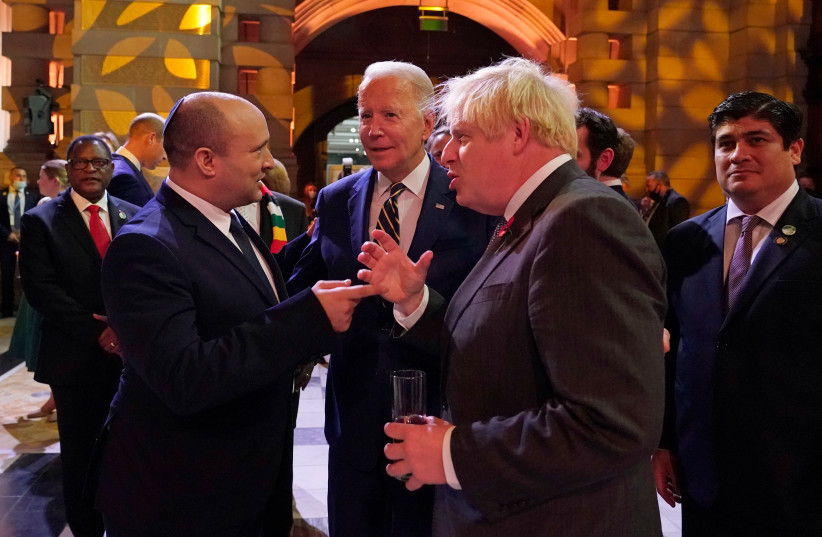The eruption of Omicron, the most recent corona variant, provides a special opportunity for establishing a new relationship between democratic governments and the public.
Combating previous variants was achieved, first and foremost, by governments imposing restrictions on citizens. Indeed, in most Western democracies, most of the public cooperated with, and abided by, governmental guidelines and instructions. However, as the uncooperative pandemic continues and changes its behavior, citizens are increasingly losing patience and discipline is weakening. In most countries, vaccination percentage has stagnated and the public ignores new governmental guidelines.
Facing this reality, democratic governments need to adopt a different strategy, one that is based upon transparency and trust between governments and citizens, based upon a joint cooperation of governments and citizens in a life-saving effort, instead of the current unilateral infliction of restrictions by governments upon the public.
Two examples illustrate the problems with the current approach.
In Britain, Prime Minister Boris Johnson was caught lying about a Christmas party he had held with his staff at 10 Downing St. last December, when the country was in lockdown and, by law, people were allowed to be away from their home only if they had a “reasonable excuse.” Johnson’s statement that he and his staff, pictured with wine glasses in their hands, “were at work talking about work,” met with public scorn that, in turn, led to serious doubts and distrust regarding the justification of the rules made by the government for the general public.

In Israel, in the beginning of December, Prime Minister Naftali Bennett convened a press conference, in which he asked the public to refrain from traveling abroad, in view of the risks posed by Omicron. Shortly afterward, the media reported that Bennett’s wife and children took off for a vacation in the Maldives. Israelis at the airport declared to local media that “if the prime minister’s wife could take a vacation abroad, so can we.”
PM Bennett’s latest embroilment has added to the public distrust. Despite the availability of Pfizer’s vaccinations, and despite the fact that Israel had emerged from the previous COVID-19 waves as the world champion, by now a real crisis of trust has developed between the public and the government, reflected by the very low vaccination rate among children. In defiance of the goal, set by Bennett’s government to vaccinate 50% of the children by the end of December, at present vaccination rate is below 20%.
In Israel, as is the case also in Britain and other Western democracies, the measure of trust that the citizens have in their leadership – in the government, the prime minister, the minister of health and the healthcare system – has a direct influence on the ability to cope with the pandemic.
AT THIS stage, the Omicron variant requires democratic states to adopt a different strategy, making public trust a centerpiece in the effort to emerge victorious from this battle.
In contrast to the above examples, a positive model is to be found in Serbia. At the very beginning of the pandemic, President Alexander Vucic decided to put the medical experts on frontstage and have them act as the spokesmen who inform the public of the state of affairs. The handling of corona by Vucic was marked by transparency and by making public cooperation, through the social networks, a centerpiece in the decision-making process. With its successful vaccination program, Serbia serves as a regional model of success in coping with the virus, combining maximum cooperation with the public and minimum restrictions on citizens.
To succeed in fighting the pandemic, government and cabinet sessions concerning the corona should be broadcast live. Medical experts should be the ones delivering the messages to the public, preceding press conferences made by politicians. By making use of the social networks to that end, the public must be invited to join the circle of decision-makers. Every government must harness the opposition parties, too, by appreciating their voice and influence, and providing them with veto rights, in order to have them, too, join in the effort to reach the correct decisions in the best interests of the public.
The same attitude should be applied to vaccination opponents and citizens who are critical of the government’s policy. Instead of censuring and condemning them, governments must hold a dialogue with them and invite them to join the decision-making process.
States that will fail to seize this all-important message that the Omicron variant has sent us, will find themselves sooner than later in the unhappy situation in which growing parts of the public will refrain from heeding the government’s guidelines and instructions. By contrast, states that will apply a different strategy, of transparency and cooperation, will succeed in coping with the current corona wave, as well as with any wave that follows.
The writer is founder of Perception media.
